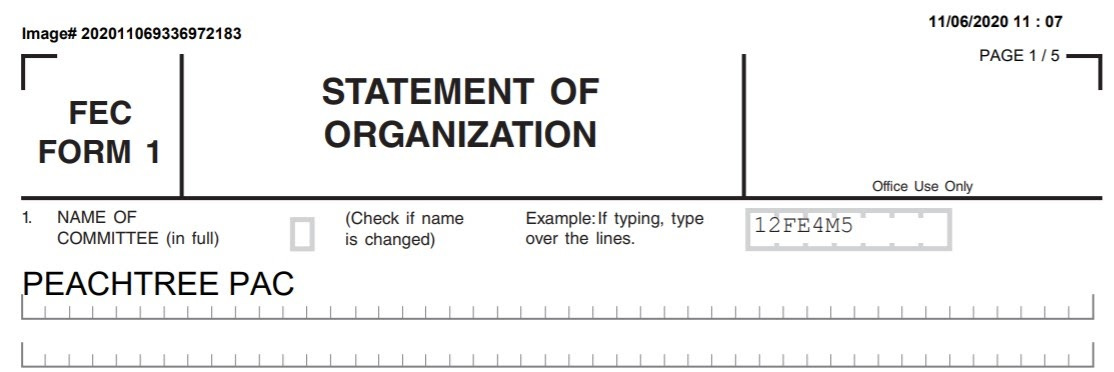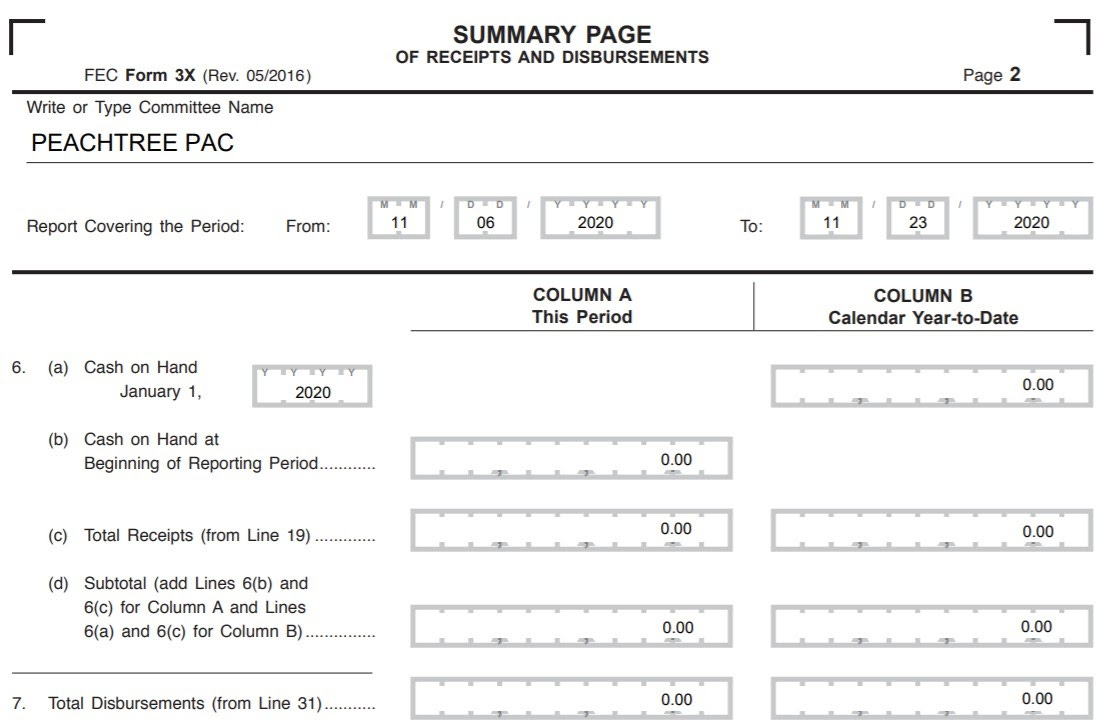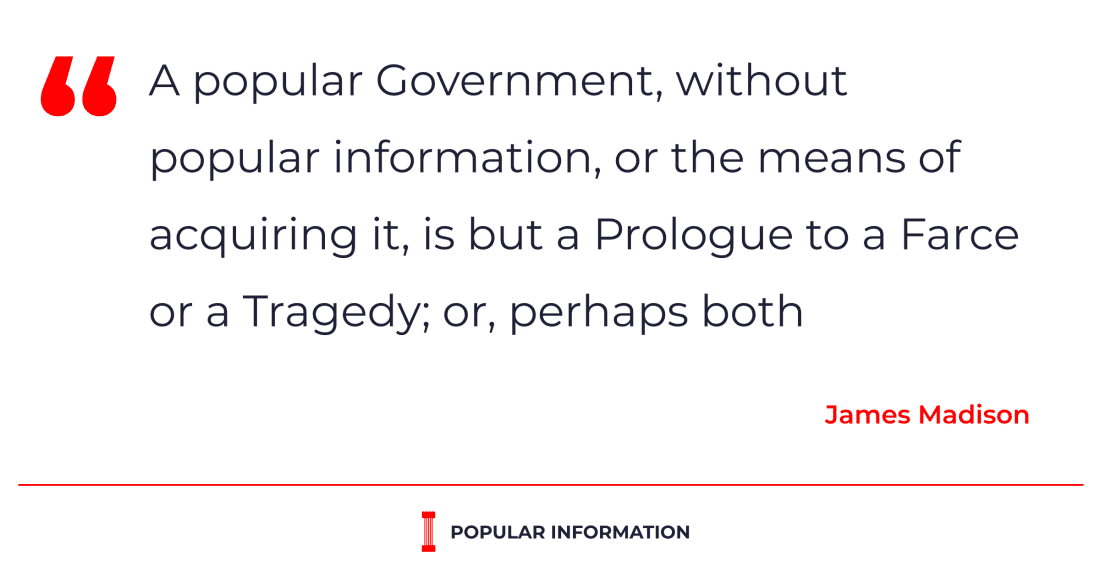There are people spending tens of millions of dollars to attack the Democrats seeking to unseat the incumbent Republican Senators in Georgia in the January 5 runoff election. But we have no idea who they are because the campaign finance disclosure system is broken.
Peachtree PAC, which has emerged as one of the largest spenders in Georgia's runoffs, filed its "Statement of Organization" with the Federal Election Commission (FEC) on November 6, shortly after the general election.
Based on this filing, there is little indication of who is behind the PAC. The only person listed is the treasurer, Julie Dozier, an operative who performs a similar function for 12 other Republican PACs, according to FEC records.
Peachtree PAC was required to make its first filing on December 3. That filing included all activity from November 6 to November 23. In the filing, Peachtree PAC reported no contributions and no spending.
The entire five-page filing is just a series of zeros.
But, on December 9, Peachtree PAC reported spending $7.1 million in ads opposing Jon Ossoff and Raphael Warnock, the two Democratic challengers for the Georgia Senate. On December 15, the Peachtree PAC reported spending another $8.4 million on ads attacking Ossoff and Warnock. The law requires independent expenditures to be reported within 48 hours. (Starting December 17, independent expenditures must be reported within 24 hours.)
But where is all this money coming from? We will not find out until after the election. Campaign finance law does not require the Peachtree PAC to reveal that information until January 31, long after the election will be over. This reveals a major flaw in our campaign finance law. The entire purpose of disclosure is to make this information available to voters, either directly or through the press. If the information isn't disclosed until after the election, it doesn't serve its intended purpose.
The operators of Peachtree PAC seem to be very familiar with the intricacies of campaign finance law. PACs have the option to file receipts and distributions with the FEC on a quarterly basis or a monthly basis. Peachtree PAC opted to file monthly. Why would a PAC seeking to shield its donors opt to file more frequently? If Peachtree PAC had opted to file quarterly, an FEC rule would require it to comply with the special filing schedule it set up for the January 5 run off. That means Peachtree PAC would have had to disclose its donors on December 24. But by opting to file monthly, it is exempt from the special filing requirement and won't have to disclose that information until January 31.
A shell PAC
There is little indication of who controls the Peachtree PAC on its FEC filings. But the Senate Leadership Fund, a Super PAC affiliated with Majority Leader Mitch McConnell (R-KY), told the Associated Press, that it is operating the Peachtree PAC.
Peachtree PAC will be operated by Senate Leadership Fund, a group affiliated with Senate Majority Leader Mitch McConnell, said SLF spokesman Jack Pandol. He declined to say who was funding the group...
“The fate of our country hangs in the balance in Georgia. This new activity through Peachtree PAC will articulate the stakes couldn’t be higher as the future of freedom is on the ballot,” SLF President Steven Law said in a statement.
The relationship between Peachtree PAC and the Senate Leadership Fund was first reported by CNN, which pieced the connection together because the two PACs share a media buyer.
While the Senate Leadership Fund copped to its relationship with Peachtree PAC to the press, Peachtree PAC was less forthcoming with the FEC. In its Statement of Organization, Peachtree PAC is required to list an "connected organization" or "affiliated committee." Dozier, on behalf of Peachtree PAC, responded "NONE."
We now know this is incorrect. The FEC requires any change to the information provided in the Statement of Organization to be updated within 10 days. No update has been filed.
Republican tactics versus Democratic tactics
National Democrats have also set up two Super PACs to run ads in the Georgia runoff election — Georgia Honor and Georgia Way. But neither PAC has sought to conceal its donors. Georgia Honor reported $5.8 million in receipts on December 3, all from Senate Majority PAC (SMP). Major recent donors to SMP include hedge fund manager Jim Simons ($8 million), internet entrepreneur Jeff Skoll ($4.5 million), and the International Union of Operating Engineers ($2.5 million). Georgia Way also reported $5 million in receipts on December 3 from the SMP.
Overall, outside groups are fueling a massive financial advantage for Republicans in Georgia. The Warnock and Ossoff campaigns have outspent the Loeffler and Perdue campaigns by $46 million. But the Republican campaigns and outside groups supporting them combined have purchased $258 million in ads, including advanced purchases through January 5. Their Democratic counterparts have purchased $181 million in ads for the same time period. Half of the Republican advantage is financed by the undisclosed backers of Peachtree PAC, which has purchased or reserved nearly $40 million in advertising.
It will be the most expensive Senate race of all time. The previous record was set in the North Carolina Senate race this year, which cost $300 million. Prior to this year, the record was Florida's 2018 campaign, which cost $213 million.
It's unclear whether the Republicans' cash advantage will be decisive. Democrats lost several Senate races where they had more money to spend than Republicans, including Maine and South Carolina.






